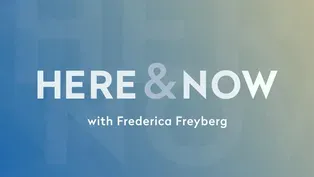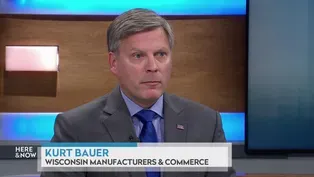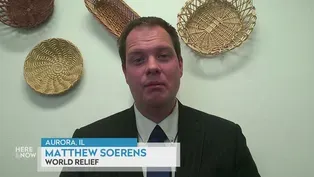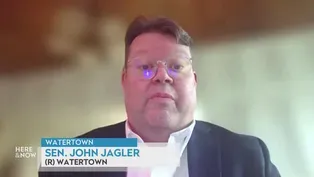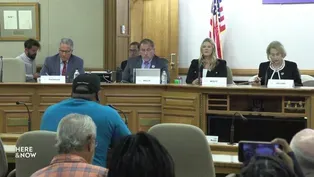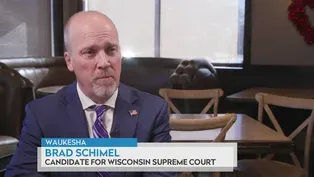Here and Now
Here & Now for February 7, 2025
Season 2300 Episode 2330 | 26m 48sVideo has Closed Captions
Watch the entire episode of Here & Now for February 7.
Watch the entire episode of Here & Now for February 7.
Here and Now
Here & Now for February 7, 2025
Season 2300 Episode 2330 | 26m 48sVideo has Closed Captions
Watch the entire episode of Here & Now for February 7.
How to Watch Here and Now
Here and Now is available to stream on pbs.org and the free PBS App, available on iPhone, Apple TV, Android TV, Android smartphones, Amazon Fire TV, Amazon Fire Tablet, Roku, Samsung Smart TV, and Vizio.
Providing Support for PBS.org
Learn Moreabout PBS online sponsorshipThe following program is a PBS Wisconsin original production.
>> In the last two days, my office has gotten over 1000 constituent calls with people angry, hurt, and terrified that the services they use every day will vanish.
>> Democrats push back hard as President Trump and Elon Musk advance aggressive downsizing of the federal government.
[MUSIC] on "Here& Now".
More on the impact of President Trump's new tariffs to refugee resettlement and the upheaval over Wisconsin's standardized test scores.
the candidates for the state Supreme Court.
It's "Here& Now" for February 7th.
>> Funding for "Here& Now" is provided by the Focus Fund for Journalism and Friends of PBS Wisconsin.
>> We are less than 60 days away from the election that will determine the balance of power on the Wisconsin Supreme Court.
We plan on bringing you continuous coverage of this important race between now and the election on April 1st.
Tonight, we'll introduce you to the conservative in this race, Brad Schimel.
Schimel is currently a Waukesha County Circuit Court judge, but has previously served as the Wisconsin Attorney General.
And before that, he was the Waukesha County District Attorney.
Here and now, senior political reporter Zach Schultz sat down with Brad Schimel at a diner in Waukesha.
>> Let's start with your judicial philosophy.
Can you explain how you approach things from the bench?
You know.
>> Officially in the legal world, we say that a person with my philosophy is an originalist, meaning you go, you go back to how the Constitution was written at the time with the intent of the founders when they wrote it.
That's that's complicated language.
I'll tell you that.
My philosophy basically is, is that I approach my role as a judge with great humility.
I respect the separation of powers that the legislature sets the laws, not the judge.
I approach it with humility, 2 toward the litigants that appear in front of my court.
I respect that they are entitled to their day in court, that they are entitled to have somebody that's going to listen to them all the way till the end of the case.
Before I go deciding or making up my mind on things.
So those are those I think that wraps up my judicial philosophy, how I view this.
>> So how do you approach something like precedent?
Because obviously in federal and state cases, we've seen a lot of precedents being overturned in recent years.
>> Well, as the circuit court judge, I respect precedent.
I don't have the authority to decide.
The Supreme Court got it wrong on a case.
As a Supreme Court justice, we have to we have to overturn precedent only very rarely and very carefully.
The whole system relies on on stability that people need to be able to predict what the law says so that lawyers can advise their clients.
So everyday citizens can know what's going to keep them from getting sued for their actions, what's going to keep them out of trouble with with the police, other things.
So you have to have that stability.
So we should have great respect for precedent.
We should we should only rarely and only in extraordinary circumstances be overturning it.
>> So what do you think about the Wisconsin Supreme Court with their drop boxes decision or the redistricting decision and the most recent iteration of the court overturning those old cases?
original case from a little over two years ago now.
I read I read the decision in this case.
I did look at some of the briefing as well.
I would have sided with the dissent in the recent decision.
I, I think they got it right that the legislature created two ways to vote early absentee.
One is put it in the US mail box, which is essentially a drop box.
You know, the whole argument was that we're making it too hard for people who don't work regular jobs that don't work, that can't get to the polling place early to drop off their, their, their ballot.
You can put it in a US mail box.
And that's a secure, safe way to mail to mail in your ballot.
Or you can bring it to your clerk in person.
I think I think that the majority got it wrong on that one.
approach to precedent with the Dobbs decision?
So obviously that at the federal level was a pretty big overturning of precedent?
>> Yep.
That was a very old precedent, too.
And it was established the United States Supreme Court is the recognized that abortion isn't in the United States Constitution.
There's no reference to it anywhere.
Therefore, the decision belongs with the people, and that's where they returned it.
And it's a it can create a messy situation, I guess, where each state is going to have their own set of rules based upon what the voters in that state want.
Mississippi and California are going to have two different, very different perspectives on abortion.
But that's the way the Constitution intended it.
If it's not in the US Constitution, it belongs to the people and the states, and that's what they recognized.
That was a, you know, it had been a long time that that that the Roe decision was in place.
But the supreme state Supreme court three years ago, almost now considered that precedent and decided it was no longer it wasn't valid.
>> So in 2023, Janet Protasiewicz kind of set a new territory in terms of talking about personal values and saying those were separate from how she intended to rule or how she would rule in a case.
Did that reset the public expectations again, for what it should sound like to hear someone running for the Supreme Court?
>> I think when she said the maps are rigged, referring to the legislative redistricting maps that wasn't talking about a personal value, that was stating, that was stating a legal opinion and a judgment.
But, well, the Judicial Ethics Commission looked at it and said nothing offensive about it.
And I guess we have to live with that.
It's worth noting that decisions by the Judicial Ethics Commission are driven by the majority on the Wisconsin Supreme Court.
That means the majority on the Wisconsin Supreme Court would have wanted to punish one of their own, and they just didn't want to.
But this isn't acceptable.
Imagine this if you went to a Brewer game and you you bought your $17 beer, but you sat down and the umpire comes out, not in the Black they're supposed to wear, but a Cardinals jersey.
You're not buying another beer because this you know how this game is going to end.
The Cardinals fan in the stands might feel good about that.
For the moment, but what they're just witnessing is the death of baseball, right.
And now you can always, with baseball, move on to another sport.
If we've got people on the Supreme Court that can't set their personal opinions aside and are wearing the jersey of a team, then our justice system doesn't survive and we don't have any other sport to go to, so to speak.
It's not acceptable and just judges and candidates for office shouldn't be talking about how they're going to rule on cases, period.
>> So there's going to be people watching this are going to say, well, you're a former Republican.
You were the attorney general of Wisconsin.
As a Republican.
You've run statewide.
How is that different?
How how do you explain to them the difference between running as a partizan versus running for this?
>> Well, first off, all of my prior roles were as a prosecutor and the Waukesha DA's office, and I did I was a Da as a Republican in Waukesha County for that and attorney general as a Republican.
Both of those roles, you don't make law.
You enforce the law the way someone else made it or wrote it.
And the same thing in my role as a judge.
But I've set those things.
I've set those partizan things aside every single day on the bench.
It's worth noting my opponent also has a partisan history.
She was chief legal counsel for Governor Jim Doyle.
It doesn't get any more partisan than being in that role.
Short of being the governor, you're the next most partisan person in that office.
Both of us have partisan histories, and it's kind of fraudulent to suggest that just because I officially ran as a Republican, I'm the only one with that kind of a history.
>> So there is a history of former partisan officeholders being on the Supreme Court.
Justice Prosser was there.
He explained to me the difference between being a judicial conservative and a political conservative can.
Do you agree with his definitions?
There.
>> Absolutely.
Being a political conservative means ascribing to certain policy values as a judicial conservative.
It is a it's a philosophy like you asked me about earlier and a judicial conservative believes that the courts should be restrained when they're looking at a law.
You interpret it the way the legislature wrote it, and you don't try to change it into some other form.
The opposite is judicial activism or being a judicial liberal, where they believe that the court's role is to is to change the law into a form that they think is best.
And that's the difference between between those judicial, conservative and judicial liberal, but very different than the political conservative and liberal judge.
>> Schimel, thanks for your time.
>> Next Friday night, you'll hear from his opponent, the Liberal candidate Susan Crawford.
As to the Wisconsin Supreme Court, it issued a decision today that says Meagan Wolfe is allowed to stay on as administrator of the Wisconsin Elections Commission.
Republicans in the legislature have been trying to remove Wolfe from her position in the wake of election conspiracies coming out of the 2020 presidential race, the court ruled unanimously that even though Wolf's four year term has expired, the Elections Commission is not required to renominate her and she can stay in her position until a majority on the commission decide to replace her in state education.
News, Republican lawmakers want to change the way the Department of Public Instruction now scores standardized tests for third through eighth graders.
That's because last year, DPI changed the cutoff scores needed to be proficient in reading or math, resulting in scores in 2024 being about ten points higher than the year before.
The new forward exam scoring also no longer aligns with the more difficult national test, known as the Nation's Report card, a bill now before the legislature would require DPI to revert back to the previous scoring model.
Chair of the Senate Education Committee, Republican Senator John Jagler, authored the bill.
And thanks very much for being here.
>> So why don't you like the new scoring methods on the statewide forward exam?
>> For multiple reasons.
I think it gives a false sense of what our kids are doing and where they're at.
But you know, the bigger picture point here is it doesn't align.
We have no way of tracking data from previous years because and the DPI admits this, that the way that they have blown up the scoring system, we can't go back and look, we can't see how the kids from the Covid pandemic, those those kids that were, you know, kindergarten, first grade, are they catching up the kids, more importantly, that are almost entering the workplace, the seventh graders, who are now high school juniors and seniors, where are they?
Have they caught up from that?
That last year?
And we can't track that data anymore.
And, you know, as I traveled around the new district, the new 13th Senate district picked up a ton of geographical territory, and that meant a lot of new superintendents, a lot of new school districts.
And the first thing I did was meet with law enforcement and meet with my school superintendents.
And they were taken aback because they were not consulted.
They had no idea this came.
And here we are.
They don't know if some of the innovation they're doing with literacy programs are working.
They have no way of going back and tracking.
And then the easiest point is we should be expecting our kids to do better.
We should set high standards, not lower them.
>> So Governor Tony Evers has also been critical of the new scoring, saying just that, that we should have the highest standards possible.
But why should legislators decide on learning assessments over educators?
And should new directives come with more funding like the $50 million for phonics instruction.
>> I don't think you can conflate the two issues of saying it should come with with more funding.
I mean, why should we get involved?
Well, honestly, I wish we wouldn't have to.
This was done in a closed situation where these there is a list of just under 100 administrators or school officials or people that they talk to for this process, but they they did this in a vacuum, and it came out and it came out, you know, let's be honest, politics is part of everything.
Came out in a in a very weird time to roll back these standards, to make our kids look better, which in effect, it did in an election year for the superintendent.
That's a little odd, but what perked my ears was the my superintendent saying, we don't agree with this.
We have.
We weren't part of this.
We don't know where this came from.
And then when you have the governor first saying flat out, you know, because those were his standards that he said she, she, they rolled back the Department of Public Instruction, rolled back the governor's standards, the education governor.
So he caught my interest when he said we shouldn't be lowering, we should be expecting high standards.
And then he kind of pivoted a little bit to criticizing the process that it was done behind closed doors without any input from stakeholders.
And he was right on both counts.
>> And apart from the scoring, why does the bill also call to revert back to how the scores are described?
For example, instead of below Basic as previously to developing.
>> Just to go back for consistency.
And one of the things that I had heard in an interview was, well, you know, if you tell a parent that their kid is below basic, that's, that's harmful, that's that's hurtful language, that's I'm sorry, that's just weak sauce to me.
That's, that's that's soft.
As I said in the in the committee hearing, you know what?
You know what hurts the kids social, you know, mental health and hurts a kid in the classes when he can't read.
And we should be focusing on that rather than what these labels say.
And like I said, it goes back the reason why we went back is we it's almost like just a reset point.
And unfortunately we're going to lose this year's data.
But I think it's worth it to go back and create some consistency.
And also create it so we can compare ourselves with Naep, the national standards, and see how we're doing.
How do we possibly know when you're talking about investing billions of dollars in education?
What is the return going?
How are our kids doing?
How are these educators using those dollars that we commit to make sure our kids can read?
And the troubling part about it is this whole issue about rolling back the standards came when the Nape scores came out this week, and it should be a shock for everybody.
It the numbers in Milwaukee are, you know, we're talking the worst scoring for fourth graders in the nation for Black kids in Milwaukee.
The achievement gap is still the lowest in the country.
But the eighth grade, eighth grade kids are also just just floundering.
And it shouldn't be acceptable to anybody.
And you can't, you know, the old line I was I was joking.
It's Super Bowl week.
You can't can't achieve perfection if you don't strive for excellence.
You know, if you strive for strive for perfection, you reach excellence.
That's what Vince Lombardi always said.
And I think it's right on this count.
We should be expecting more.
>> We need to leave it there.
Senator John Jagler, thanks very much.
>> Appreciate it.
>> Banner headlines of 25% tariffs on Mexico and Canada from President Trump one day.
Then an about face.
And they're on pause for 30 days.
And across the board additional 10% U.S.
Tariff on China remains in plac.
Unsettled times and fast moving.
What's the reaction in the business community in Wisconsin for that, we turn to Kurt Bauer, president and CEO of Wisconsin Manufacturers and Commerce.
And >> My pleasure.
>> So last weekend, when you heard the news of the 25% tariff on Canada and Mexico, what was your reaction?
>> Not a surprise.
He campaigned on this.
We knew something was coming.
We weren't sure exactly how broad it was going to be.
We thought it was a negotiating tactic, particularly with Canada.
We thought that there'd be something more with Mexico.
We obviously thought something was going to happen with China, but it was a little broader than we thought.
>> How relieved were you then when it was kind of pulled back?
>> I think the pause is good.
I'm concerned the retaliatory tariffs would be rough on Wisconsin.
We are a manufacturing state.
We are a agricultural state.
We make things, we process things, we grow things, and we export them around the world.
Canada is our number one trading partner.
We have a positive trade with them right now.
The second largest is Mexico and then China.
So all three are on the chopping block.
They account for about 50% of Wisconsin exports.
So this could have a very significant impact on the state of Wisconsin and our manufacturing and agricultural industries.
>> So it's apparently a 30 day pause.
Do you think it will be reenacted?
of talking across the border.
I've talked with my counterparts in Quebec, Ontario and Alberta.
We have a very strong relationships among the trade associations across the border.
We're doing everything we can to try and work something out as best we can.
Ultimately, this is up to the president.
He does have the authority to do this, and we're hoping that we're able to work out some sort of deal.
And it looks like, you know, you got Mexico and Canada, made some accommodations.
We're seeing that from other countries as well.
So hopefully this will work out and we won't have tariffs and we won't have a trade war.
>> Yeah.
If business moves uncertainty though.
What's this climate like.
>> Well that's funny you should say that because business is inherently uncertain.
And this government shouldn't make it worse.
This certainly does.
We saw during Covid 19 that businesses were incredibly resilient.
They were adaptable.
They'll have to be again, if this goes into place.
The concern we have is supply chain and energy.
We get a lot of our energy from Canada, particularly Alberta.
We don't want those flows cut off that will have a major impact on the cost of energy in the state of Wisconsin.
Supply chains are difficult as well.
You can't create a supply chain, particularly on precise products and raw materials.
So, you know, there are we have skin in the game, to be sure.
>> What about the additional 10% tariff on China?
>> Well, we've seen a lot of our members moving away from China for a variety of different reasons.
China has not been a good actor on trade.
They have manipulated their currency.
They have stolen IP, they've forced tech transfers in exchange for market access.
They've subsidized their industries.
They have dumped into the United States to put American competitors out of business.
So 86% of my members support tariffs on China because they don't believe that they've been a fair player in trade.
Look, we're a manufacturing state, as I said earlier, we're an agricultural state.
We want to sell to the world, but we want it to be on a fair and equal basis.
to Wisconsin if the Canada and Mexico tariffs or a trade war does happen?
>> It depends on how long it lasts.
It depends on specifically what.
But it would certainly have an impact and we'd see it right away.
It depends on the industry.
But most businesses, most sectors would see some effect right away.
And of course that would trickle down to consumers as well.
what should consumers brace for?
>> Well, let's hope that we don't have to brace for anything.
But it's hard to know.
I think gas prices would probably go up.
You'd see impact on products and maybe some agricultural products that we bring up from Mexico.
I was thinking of the Super Bowl.
If you want your guacamole, avocados largely come from Mexico.
All of that could be higher prices.
>> Briefly, you said you were in Washington this week.
Have you spoken with the Trump administration about this and >> We had a delegation at the white House this week.
We did talk about it.
I was not there.
I was at the Pentagon having a different conversation, not Hill talking to the delegation.
They're concerned about it.
They certainly recognize that Wisconsin is a major manufacturing and agricultural state.
They know the stakes.
>> All right.
Kurt Bauer, thanks very much.
>> My pleasure.
>> A President Trump executive order late last month suspended refugee admissions to the U.S. And resettlement funds.
Last year, more than 1500 refugees from all over the world settled in Wisconsin.
The Christian humanitarian nonprofit Refugee Resettlement agency World Relief operates in the Fox Valley and Chippewa Valley in Wisconsin.
We turn to Matthew Soerens, vice president of advocacy and policy at World Relief.
For more on this situation.
And thanks very much for being here.
>> Yeah, I'm so glad I can be with you.
>> So we understand that refugees ready to travel to the U.S. Had their flights canceled when this executive order came, came down.
Was your agency in Wisconsin expecting people on those flights or flights in subsequent days?
>> Yeah.
I mean, we had travel that was that was confirmed.
Of course, we were aware that the president might do something similar to what President Trump did back in 2017.
So I think we had we're aware of this being a possibility of suspending refugee resettlement.
And in cases where it was family reunification, where we've got somebody in Wisconsin who was waiting to be reunited to a loved one, you know, I think we would have at least shared that we're concerned that this could be a possibility, but that doesn't do anything to change the devastation when a family that in some cases might have been waiting for a decade.
Apart, often with that loved one stuck in a refugee camp overseas, and that travel had to be canceled.
And we are hopeful and prayerful that the president will resume refugee resettlement after the initial 90 day suspension of resettlement that was announced on his first day in office.
>> Because where does the suspension of the program leave those people cleared to come here and those hoping to?
>> Yeah, it's it leaves them with a lot of uncertainty.
And I mean, frankly, refugees live in some of the most vulnerable situations in the world.
Often in camp settings, often in a second country where they're being allowed to reside but not to work lawfully, so not able to provide for themselves.
So that opportunity for resettlement to rebuild their lives in a state like Wisconsin, while also contributing to the economy and meeting key labor needs, is an incredible opportunity.
And we're just really devastated.
And this includes people who are allies of the US military from Afghanistan who are at risk because of their service to the United States.
Mission in Afghanistan.
It includes persecuted Christians and other religious minorities who were persecuted for their faith in their country of origin and were desperate for their religious liberty that we offer here in the United States.
So it is really devastating.
And again, we're really hoping and praying.
You know, President Trump has said that he values legal immigration.
He has talked as recently as in the last few days about wanting to defend persecuted Christians.
The refugee resettlement program is an important way to be able to do both those things.
from the Trump administration, or have you reached out to them on this?
>> We have, you know, we actually even before inauguration, we had helped mobilize a Christian statement on refugee resettlement.
And we are an evangelical Christian organization.
So we've had more than 11,000 Christians around the country.
Sign on to a statement.
Again, many of these are people who voted for President Trump.
This isn't about Republicans or Democrats.
But on this question of refugee resettlement, this unequivocally legal form of immigration that helps people who fled persecution, there's really broad bipartisan support.
But I would say, you know, we've communicated that to the white House.
The actually the communication that we've received Post-inauguration has been discouraging because we were actually told on January 24th, a few days after inauguration, that not only was refugee resettlement being suspended going forward for at least 90 days, which we had opposed but maybe anticipated might be a possibility, but then we got word on the 24th of January that we should stop all work to provide support for refugees who had already been resettled in the previous 90 days in places like Appleton and Eau Claire and Oshkosh.
And that has put us in a really challenging situation because we've committed to provide housing for those refugees in Wisconsin.
It's about 175 people.
And that's, of course, a lot of resources that we had expected the federal government to follow through on their commitment for.
And now we're working with churches and others, individual donors to meet that very significant gap.
>> I understand that is about 175 refugees newly here that you were hoping to provide these services for, and how much in in loss funding does that represent for you?
>> You know, I don't know the specific figure for Wisconsin at the national level.
It's we estimate it's somewhere around $8 million that we are needing to raise very quickly.
That's not actually all the costs, but to cover the most basic expenses for the roughly 4000 people that we've resettled around the country.
And again, 175 of those are there in Wisconsin.
And that, again, the biggest cost there is rent.
You can do the math on covering rent for 175 people for three months, which is what the federal government committed to these people before they arrived and what we committed to them as well.
And we're doing our very best to keep that commitment.
We don't want to see anyone without housing, and we want them to be able to be economically self-sufficient.
On month four and have a job and be able to cover their own expenses.
That's how this system usually works.
But when the government kind of pulls out of the public, part of that public private partnership, we're relying very heavily on churches and individual donors to help fill in those gaps.
>> All right.
We need to leave it there.
Matthew Soerens, thanks very much, and thanks for your work.
>> Thank you.
>> For more on this and other issues facing Wisconsin, visit our website at PBS Wisconsin.
Org and then click on the news tab.
That's our program for tonight.
I'm Frederica Freyberg.
Have a good weekend.
[MUSIC] >> Funding for "Here& Now" is provided by the Focus Fund for Journalism and Friends of PBS Wisconsin.
Here & Now opening for February 7, 2025
Video has Closed Captions
The introduction to the February 7, 2025 episode of Here & Now. (1m 5s)
Kurt Bauer on How Tariffs Could Impact Wisconsin Businesses
Video has Closed Captions
Kurt Bauer on the Trump administration's plans for tariffs on Canada, Mexico and China. (4m 51s)
Matthew Soerens on Suspending Refugee Resettlement in the US
Video has Closed Captions
Matthew Soerens on an executive order to suspend refugee resettlement and its impacts. (5m 24s)
Sen. John Jagler on Scoring Standardized Tests in Wisconsin
Video has Closed Captions
John Jagler on a bill to revert how Wisconsin scores standardized reading and math tests. (5m 50s)
Wisconsin Supreme Court Rules Meagan Wolfe May Remain at WEC
Video has Closed Captions
The Wisconsin Supreme Court ruled on Meagan Wolfe at the Wisconsin Elections Commission. (42s)
Brad Schimel on the 2025 Wisconsin Supreme Court Race
Video has Closed Captions
Brad Schimel on the Wisconsin Supreme Court and his perspectives on law and politics. (8m 17s)
Providing Support for PBS.org
Learn Moreabout PBS online sponsorship